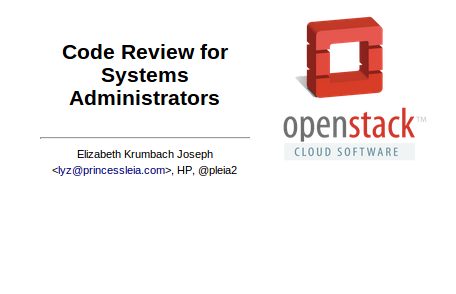Last week I finally had the opportunity to attend Texas Linuxfest. I first heard about this conference back when it started from some Ubuntu colleagues who were getting involved with it, so it was exciting when my talk on Code Review for Systems Administrators was accepted.
I arrived late on Thursday night, much later than expected after some serious flight delays due to weather (including 3 hours on the tarmac at a completely different airport due to running out of fuel over DFW). But I got in early enough to get rest before the expo hall opened on Friday afternoon where I helped staff the HP booth.
At the HP booth, we were showing off the latest developments in the high density Moonshot system, including the ARM-based processors that are coming out later this year (currently it’s sold with server grade Atom processors). It was cool to be able to see one, learn more about it and chat with some of the developers at HP who are focusing on ARM.
That evening I joined others at the Speaker dinner at one of the Austin Java locations in town. Got to meet several cool new people, including another fellow from HP who was giving a talk, an editor from Apress who joined us from England and one of the core developers of BusyBox.
On Saturday the talks portion of the conference began!
The keynote was by Karen Sandler, titled “Identity Crisis: Are we who we say we are? which was a fascinating look at how we all present ourselves in the community. As a lawyer, she gave some great insight into the multiple loyalties that many contributors to Open Source have and explored some of them. This was quite topical for me as I continue to do a considerable amount of volunteer work with Ubuntu and work at HP on the OpenStack project as my paid job. But am I always speaking for HP in my role in OpenStack? I am certainly proud to represent HP’s considerable efforts in the community, but in my day to day work I’m largely passionate about the project and my work on a personal level and my views tend to be my own. During the Q&A there was also interesting discussion about use of email aliases, which got me thinking about my own. I have an Ubuntu address which I pretty strictly use for Ubuntu mailing lists and private Ubuntu-related correspondences, I have an HP address that I pretty much just use for internal HP work and then everything else in my life pretty much goes to my main personal address – including all correspondences on the OpenStack, local Linux and other mailing lists.
The next talk I went to was by Corey Quinn on “Selling Yourself: How to handle a technical interview” (slides here). I had a chat with him a couple weeks back about this talk and was able to give some suggestions, so it was nice to see the full talk laid out. His experience comes from work at Taos where he does a lot of interviewing of candidates and was able to make several observations based on how people present themselves. He began by noting that a resume’s only job is to get you an interview, so more time should be spent on actually practicing interviewing rather than strictly focusing on a resume. As the title indicates, the key take away was generally that an interview is the place where you should be selling yourself, no modesty here. He also stressed that it’s a 2 way interview, and the interviewer is very interested in making sure that the person will like the job and that they are actually interested to some degree in the work and the company.
It was then time for my own talk, “Code Review for Systems Administrators,” where I talked about how we do our work on the OpenStack Infrastructure team (slides here). I left a bit of extra time for questions than I usually do since my colleague Khai Do was doing a presentation later that did a deeper dive into our continuous integration system (“Scaling the Openstack Test Environment“). I’m glad I did, there were several questions from the audience about some of our additional systems administration focused tooling and how we determine what we use (why Puppet? why Cacti?) and what our review process for those systems looked like.
Unfortunately this was all I could attend of the conference, as I had a flight to catch in order to make it to Croatia in time for DORS/CLUC 2014 this week. I do hope to make it back to Texas Linuxfest at some point, the event had a great venue and was well-organized with speaker helpers in every room to do introductions, keep things on track (so nice!) and make sure the A/V was working properly. Huge thanks to Nathan Willis and the other organizers for doing such a great job.





